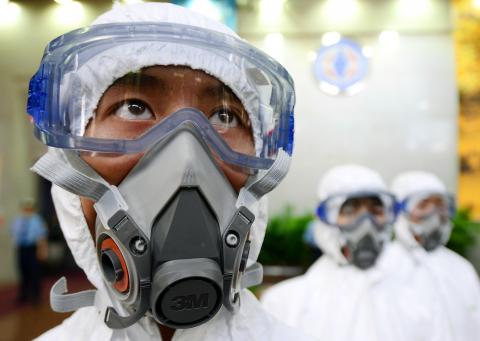|
Activists slam lack
of accountability
NUCLEAR INDEMNITY: Greenpeace said contractors
had no right to ask Taiwanese to trust the safety of nuclear reactors if they
are not prepared to accept any liability
By Jake Chung / Staff writer, with CNA

Masked Greenpeace demonstrators
pose for a photo in front of the building of Taiwan Power Co in Taipei to
protest against the construction of the Fourth Nuclear Power Plant yesterday.
Photo: Sam Yeh, AFP
Greenpeace Taiwan yesterday said that in
the event of a nuclear accident at the Fourth Nuclear Power Plant in New Taipei
City¡¦s (·s¥_¥«) Gongliao District (°^¼d), none of the subcontractors working on the
power plant would have to shoulder any responsibility.
At a press conference co-hosted by the Green Citizen¡¦s Action Alliance, the
organization said that in the event of a problem at the plant, General Electrics
and Mitsubishi are indemnified against all responsibility.
Senior Greenpeace member Ku Wei-mu (¥j°¶ªª) said the contractors had no right to
ask Taiwanese to trust the safety of nuclear reactors if they themselves were
not prepared to accept liability.
As a state-owned enterprise, Taiwan Power Co (Taipower) would have to pay people
compensation with their own tax money, Ku said, adding that it would in essence
mean victims would subsidize themselves.
The organization pointed to the Fukushima Dai-ichi disaster in Japan as an
example, saying that the cost of reparations has reached ¢D2.6 trillion (US$26.4
billion), but due to Tokyo Electric Power Co¡¦s inability to pay, the Japanese
government had nationalized the company and in so doing shifted the costs of
nuclear disaster reparation onto taxpayers.
The report pointed out that in the event of a nuclear accident at the Fourth
Nuclear Power Plant, a 50km fallout radius would encompass Taipei, New Taipei
City, Keelung and Yilan County, adding that the potential economic loss per
annum has been calculated at more than NT$33.9 trillion (US$1.1 trillion).
The report claimed that this figure does not include public healthcare costs,
water system pollution, cultural and educational losses, or a fall in
real-estate prices.
Meanwhile, alliance secretary-general Tsuei Su-hsin (±ZİhªY) said that even if the
threat of nuclear disaster were to be exempted from consideration, the
construction of the Fourth Nuclear Power Plant was still problematic.
Despite Taipower conducting a nuclear safety inspection of the power plant, it
could not resolve many of the structural problems that the plant had accumulated
over the two decades since its inception, Tsuei said, adding that the government
should halt its construction once and for all to prevent further and greater
losses.
Supporters of the alliance and the organization carried banners and wore white
Hazmat suits yesterday to declare their anti-nuclear ideals.
Standing at 12 major intersections in Taipei, including Dunhua S Road, Zhongxiao
E Road, Nanjing E Road and Xinyi Road, activists unfurled large banners warning
the public of the dangers of a nuclear disaster.
In response, Taipower said that it respected a diverse democratic society and
the freedom of speech that comes with it.
|
![]()
![]()
![]()